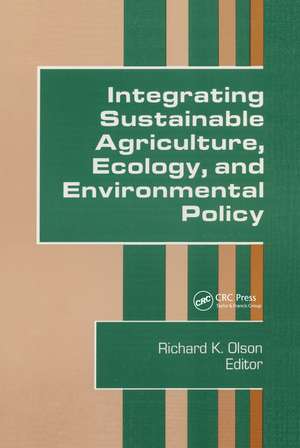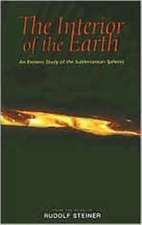Integrating Sustainable Agriculture, Ecology, and Environmental Policy
Autor Raymond P Poincelot, Richard Olsonen Limba Engleză Hardback – 29 dec 1992
This multidisciplinary examination provides readers interested in agriculture with a valuable introduction to related work in other fields including ecology and economics. Agronomists, ecologists, educators, and policymakers will find essential information on diverse topics including:
- the definition and measurement of ecological sustainability in agriculture
- landscape ecology and the design of sustainable agricultural landscapes
- soil ecology as a foundation for sustainable agriculture
- Federal agricultural policies as incentives or deterrent to sustainable agriculture
- applying farming systems research and extension to sustainable agriculture
- population growth and other threats to sustainable agriculture
- environmental policies and their effects on sustainable agriculture
- the role of precollege education in developing sustainable agriculture
Preț: 593.95 lei
Preț vechi: 799.41 lei
-26% Nou
Puncte Express: 891
Preț estimativ în valută:
113.65€ • 118.96$ • 94.59£
113.65€ • 118.96$ • 94.59£
Carte tipărită la comandă
Livrare economică 31 martie-14 aprilie
Preluare comenzi: 021 569.72.76
Specificații
ISBN-13: 9781560220244
ISBN-10: 1560220244
Pagini: 180
Dimensiuni: 148 x 210 x 13 mm
Greutate: 0.27 kg
Ediția:1
Editura: CRC Press
Colecția CRC Press
ISBN-10: 1560220244
Pagini: 180
Dimensiuni: 148 x 210 x 13 mm
Greutate: 0.27 kg
Ediția:1
Editura: CRC Press
Colecția CRC Press
Public țintă
ProfessionalCuprins
Contents Conference Proceedings
- Integrating Sustainable Agriculture, Ecology, and Environmental Policy
- The Future Context of Sustainable Agriculture: Planning for Uncertainty
- Federal Policies as Incentives or Disincentives to Ecologically Sustainable Agricultural Systems
- Building Sustainable Agriculture: A New Application of Farming Systems Research and Extension
- Ecological Sustainability in Agricultural Systems: Definition and Measurement
- Using Knowledge of Soil Nutrient Cycling Processes to Design Sustainable Agriculture
- Landscape Ecology: Designing Sustainable Agricultural Landscapes
- Sustainable Agriculture Research at the Watershed Scale
- Addressing Information Needs to Support Sustainable Agriculture Policies
- Reducing Agricultural Impacts on the Environment: Current EPA Program and Research Activities--and Future Directions
- Sustainable Agriculture Research and Education Program: With Special Reference to the Science of Ecology
- Precollege Education: A Vital Component if Sustainable Agriculture is to Take Root
- Reference Notes Included
Descriere
Find an interdiscliplinary view of sustainable agriculture that emphasizes the potential contributions of ecology to agricultural sustainability in this groundbreaking book. Integrating Sustainable Agriculture, Ecology, and Environmental Policy explores how ecological knowledge, applied as part of a multidisciplinary effort, can be used to design a sustainable and environmentally sound agriculture. This interdisciplinary approach ensures that the results are beneficial to all components, for example, an ecologically based management scheme which bankrupts the farmer is not considered a viable option for sustainable agriculture. These thought-provoking chapters are an excellent introduction to the contributions of ecological principles to an environmentally sound sustainable agriculture.














